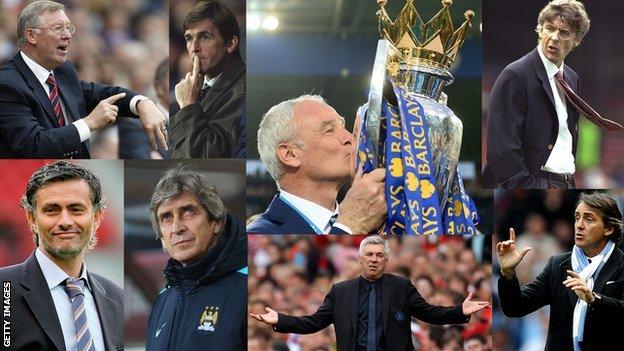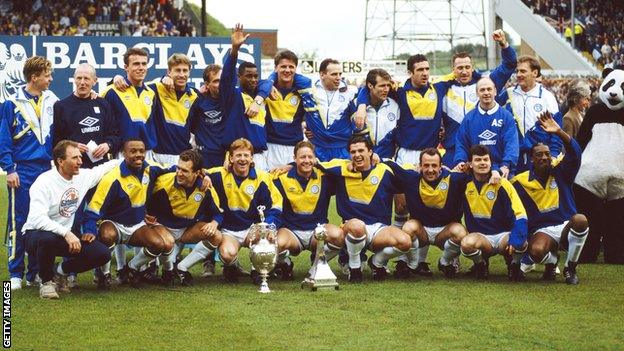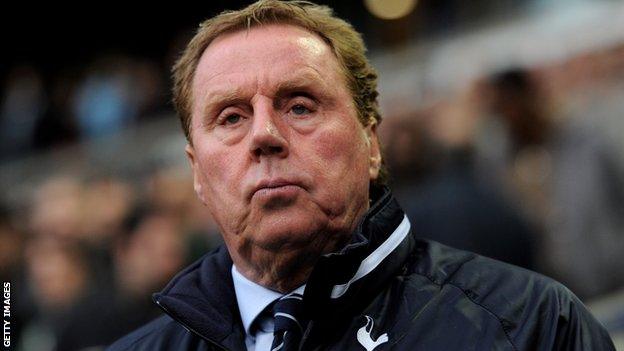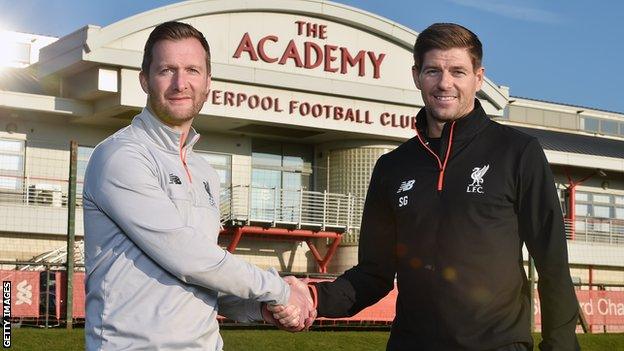Dyche, Howe, Allardyce - will an English manager ever win the Premier League?
- Published
- comments

Only eight different managers have won the Premier League - none of them are English
To mark 25 years since the last English manager won the top flight, a BBC Radio 5 live special asks if an English manager will ever win the Premier League.
More English managers have got their hands on the World Cup than the Premier League title.
The media can be more guilty than most of thinking that football began with the Premier League's inaugural campaign in 1992-93, but, in this instance, it was the end of an era.
This season's 25th instalment also marks a quarter of a century since Howard Wilkinson became the last Englishman to guide a club to become champions of England. His Leeds side pipped Alex Ferguson's Manchester United to win the title only two years after being promoted from the second tier.
Since then, glory has been tasted by two Scots, a Frenchman, a Portuguese, a Chilean and, when Antonio Conte completes the job with Chelsea, four Italians.
English managers are getting further away, too. In the first edition of the Premier League, 16 of the 22 bosses were from England. Now there are six. Last season, the top flight ended with only four clubs managed by Englishmen, and that includes Everton's caretakers.
In 1993, Englishman Ron Atkinson was second with Aston Villa. The only other native to reach the top two is Kevin Keegan, and that was in 1996 (Brian Kidd's two-game spell in charge of second-placed Manchester City in 2013 hardly counts).
Englishmen gradually vacated the top three, then the top four, five, six and seven. Last season was the first Premier League without an English boss finishing in the top half.
To what extent have English managers been affected by the foreign money, owners and players that characterise the top flight? Should homegrown bosses look abroad in order to grow their knowledge and reputation? Can a manager find a way from the lower leagues to the summit of the domestic game?
Most importantly, will an English manager ever win the Premier League?

Howard Wilkinson (bottom left) celebrates winning the title with Leeds United
Welcoming the world...
If the 2017 Premier League belongs to the world - backed by money from across Europe, Asia and America, managed by bosses from 11 different countries, populated by players from countless others and supported by fans across the globe - then the 1992-93 version was as English as fish and chips on a wet day in Southport, albeit with a few tourists from the rest of the UK and Ireland.
Of the 22 managers that ended the season, the six that weren't English were made up of four Scots, a Welshman and an Irishman. Bar Ossie Ardiles' spell in charge of Spurs, the Premier League remained entirely managed by Britons and Irishmen until 1996.
Arsene Wenger's arrival at Arsenal in that year has long been described as a Frenchman bringing a revolution to English football - new attitudes to diet, training, alcohol and professionalism.
Wenger did the Double in 1998, 12 months after Chelsea lifted the FA Cup to make Ruud Gullit the first manager from outside of the UK and Ireland to win one of English football's major trophies.
Their success piqued attention throughout the Premier League - former Liverpool chief executive Rick Parry said Wenger caused clubs to "rethink the approach" - but that was not the only reason that eyes began to glance abroad.
An expanded Champions League - England got two places in 1997 and three in 1999 - was one of the factors that contributed to Liverpool recruiting Gerard Houllier to work alongside existing manager Roy Evans in 1998.
"We wanted to bring someone in from overseas, we wanted to add that European dimension. That was a very deliberate decision," said Parry. "We felt the game was internationalising and that you couldn't just survive with an island league.
"You had to be aware of what was happening across borders and be able to compete with the top European clubs. We felt we needed that European experience to add to a successful base."
When the time came to replace Houllier in 2004, sights were set higher. To win the Premier League, the Reds felt they needed a manager with championship-winning experience.
By that time, though, the only managers in the English top flight to have won it were Wenger and Ferguson, neither of whom were ever likely to be available.
Liverpool's appointment of Rafael Benitez, a man who won two Spanish titles with Valencia, would be replicated by the arrivals of serial winners Jose Mourinho at Chelsea, Roberto Mancini at Manchester City and, much later, Louis van Gaal at Manchester United.
"We had a very specific criteria that narrowed the selection," added Parry. "Rafa seemed like a perfect fit."
"It was nothing to do with a sexy image, it was how he and the world-class Spanish players he brought in could add value to the holy grail of winning the Premier League."
...and the world takes over
The arrival of managers from outside of the UK and Ireland began as a trickle, but is now a steady and self-replenishing stream. At the end of 2004-05 there were five bosses from overseas, seven by 2009-10 and 10 by '13-14. Earlier this season, that number peaked at 13.
If the touchline is increasingly multi-national, it is nothing compared to the boardroom.
What began with Norwegian investment at Wimbledon and Mohamed Al Fayed taking his Fulham to the top flight was followed by a mid-2000s avalanche of cash brought by the likes of Roman Abramovich and the Glazer family. Now, there are only four Premier League clubs that are not influenced by foreign money.
"The biggest single reason why there are more foreign managers is foreign ownership," said former England defender Phil Neville.
"A lot of these owners attach themselves to a particular agent who has foreign managers on their books and that agent will promote their own.
"In Europe, Spain and Italy in particular, they like to give opportunities to their own managers, rather than bringing someone in from outside."
To illustrate that point, there are eight non-German bosses in the Bundesliga, seven non-Spanish coaches in La Liga, seven non-French managers in Ligue 1 and only four non-Italians in charge of Serie A clubs.
Barring a Leicester-style shock (delivered by an Italian), Premier League winners for the foreseeable future are likely to come from six clubs - Manchester United, Manchester City, Liverpool, Arsenal, Chelsea and Tottenham Hotspur. Therefore, for an English manager to lift the title, he would have to be in charge of one of those clubs.
And therein lies a problem. Neither United or Arsenal have had an English boss since 1986. Chelsea's last full-time English manager was in 1996, while City haven't looked at home since the Abu Dhabi United group took over. Liverpool's only English stewardship since Roy Evans left in 1998 was Roy Hodgson's six months at Anfield.
These clubs have had plenty of success with bosses from the rest of UK and Ireland - Ferguson, George Graham, Kenny Dalglish - and taken chances on others - David Moyes and Brendan Rodgers. However, last season was the first that overseas bosses in the top flight outnumbered Britons and Irishmen.
Of that top six, Spurs have had the most recent success with an English manager, with Harry Redknapp the last Englishman to finish inside the Premier League's top four in 2012.
"It's about getting the opportunity, but the lads don't get the chance," said Redknapp. "They work their socks off to get their coaching badges, but when the top jobs come up they are never mentioned."
'It's sexy to have a foreign manager'
Still, it can be strongly argued that a Premier League owner, chairman or chief executive wanting the best for their club is right to look abroad.
Parry's explanation of Liverpool's recruitment of Houllier and Benitez is logical - it is only natural that a club signing the very best players from all over the world would want to do the same when it comes to the manager.
Can, then, English managers be considered to be among the best on the planet?
"The perception is that foreign coaches are better educated and it's harder to qualify overseas than it has been in England," said Parry.
"That perception has been a reality. Going back a decade or two, when English football had no requirements to be a manager, it was a fact of life that in Germany, Spain and Italy you had to have the qualifications or you couldn't coach. We were the last bastion of complete freedom - we were behind the curve in that sense.
"That was probably a setback, but I'd love to feel that we were catching up."
Redknapp, though, feels English bosses are not lacking in quality, but are up against it when it comes to image.
Sam Allardyce may have had his tongue planted in his cheek when he said that he would be managing a top-four club if his name was "Allardici",, external but the point still stands.
Is the designer suit and manicured stubble of a continental boss more appealing than the duvet coat of his English counterpart?
"It's sexy to have a foreign manager," said Redknapp. "Owners think he was so and so, or he played for him, he managed this club when, in reality, they are no better than what our lads are.
"It's my honest belief that if you put Sean Dyche in charge of a top six club, they will still be in the top six. If you put any of the top six managers down at Burnley, they won't do any better than what he's done."

Harry Redknapp took Tottenham to fourth in 2012, but Chelsea's Champions League win denied Spurs a place in Europe's top club competition
Should I stay or should I go?
And so English bosses face multiple barriers to obtaining managerial jobs at the biggest clubs in the land.
Foreign managers are more attractive to foreign owners, are perceived to have greater knowledge of the European game and have often built a reputation through winning trophies in the biggest leagues on the continent.
An English manager could (and maybe even should) come to the conclusion that the best way to make himself appealing to the biggest clubs in the Premier League is to leave these shores to manage, learn and, hopefully, win in Europe.
But if English bosses are maligned at home, why should they be taken seriously abroad?
"I don't think English coaches are held in that high esteem abroad," said Neville. "There's a stigma attached to the coaches that leave England to work abroad and there are not many opportunities."
Neville speaks from the bruising experience of assisting brother Gary in an unsuccessful spell in charge of Valencia, but he insists he will see the benefits if he decides to return to coaching.
"There's a different world out there," added the former Manchester United and Everton man. "I have learned so much in the past 18 months, not just on the training field, but about the culture and myself.
"Watching, coaching, little things that will hopefully stand me in good stead for the rest of my coaching career."
'Don't blame them, look at yourself'
The reality, though, is that a new English manager who does not have the benefit of 50 international caps is likely to begin his career in League One or League Two - if he is lucky.
And Redknapp makes a strong point when he says that the only way for an English manager to reach the top flight is to win promotion from the Championship.
The last manager of any nationality to be appointed to a Premier League club from a job in the Football League (not unemployed, promoted from within or taken from abroad) was Chris Hughton, who moved from Birmingham to Norwich in the summer of 2012. More than 50 bosses have been recruited by top-flight clubs since then.
"We need to make sure we promote and market the CVs of up-and-coming coaches," said League Managers' Association chief executive Richard Bevan. "We need to make sure that the agents who are advising foreign owners are aware of our members."
One option open to those ending the most stellar playing careers is to take a job coaching in an academy and work upwards.
Steven Gerrard, the new Liverpool Under-18s coach, may have come to the conclusion that he is much more likely to get a chance with the Reds first team by being taken from the Anfield system, rather than gambling on success in the lower leagues.

Steven Gerrard will manage the Liverpool Under-18s from next season
"If you asked Steven Gerrard to become MK Dons manager, he doesn't know anything about League One football, or even the Championship," said Neville. "He never played in it and maybe never watched a game. He'd be setting himself up for a fall.
"When I finished my career I wanted to go into management. I was an assistant for a couple of years, but wanted my own job. I thought I'd struggle to get a club, so wondered what another path could be, maybe at a youth team or an under-18 team.
"You see it a lot in Spain - we have Curro Torres, a former Spain international, at Valencia. He's had four seasons as the B team manager and now he's ready to go out on his own."
But for those who do not have the option of an academy job at a mega-club, the route to the top must start much further down the pyramid.
Historically that has been no barrier to success - World Cup winner Sir Alf Ramsey's first job was with third-tier Ipswich Town, the same level at which Redknapp inherited Bournemouth.
Eddie Howe famously kept the same club in the Football League despite a 17-point deduction, while Allardyce began as player-manager of Irish club Limerick.
For David Artell, a 36-year-old who has guided Crewe to League Two safety since being given his first managerial gig in January, Howe gives inspiration that the mountain can still be scaled.
"Why should I think there's anything stopping me from making it to the top?" he said. "Maybe that's naivety, but I truly believe I will go as far as my work ethic, desire and commitment will take me.
"I don't think that will stop at a chairman's door because a Portuguese fella or a French fella is better than me.
"You can say opportunity is limited because of all the foreign managers in the Premier League, but don't blame them. You have to look at yourself first. Excellence can't just be picked up, you have go and seek it."
His optimism, ambition and bullishness is laudable, but tempered by the bleak words of Redknapp.
"I don't see a top-six club appointing an Englishman for a long time to come," he said.
"It's a long way down the line before an Englishman wins the Premier League. The top six from this season will be the top six again next year. They all have foreign managers.
"Hopefully it will change, but not in the near future."